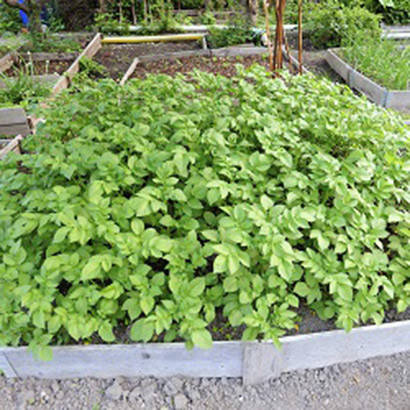
Shreveport’s children’s and youth gardening program is located at the Valencia Park Community Center, one of 15 community centers that are part of the city’s Public Assembly and Recreation Department (SPAR). Valencia Park is located in a predominantly African-American neighborhood called Stoner Hill. Stoner Hill, like all of the neighborhoods where the city’s community centers are located, is a low income neighborhood. SPAR originally envisioned the children’s garden as a beautification project in which the kids would also learn about vegetable gardening. However, when SPAR staff realized that Valencia Park is in an area with no nearby grocery stores, only fast-food restaurants and convenience stores, they changed the focus from beautification to increasing residents’ access to fresh food. That goal was soon coupled with additional goals. First, teaching children and youth gardening skills to produce their own food. Second, providing food for the neighborhood and providing an opportunity for neighborhood youth to develop entrepreneurial skills through marketing, packaging, and selling their produce to residents of their own neighborhood. The garden program began in 2009 and there are now about 25 plots in the garden and an orchard.
The three gardening programs at Valencia Park take advantage of Shreveport’s year-round growing season. The after-school program meets once a week in the garden and includes 25 children aged 4 to 17. Twenty five older kids aged 11 and up are in the summer program, called Fit for Kids, and also meet weekly in the garden. The Urban Youth Farm is the third and newest component. During summer, high school students receive stipends to work in the garden, teach younger children gardening skills, and market and sell their produce. One of the requirements for the program was having participated in the gardening program when they were younger.
Staff of the community center and youth from the Urban Youth Farm organize a weekly farmers’ market at the center. The youth sell their produce to neighborhood residents for less than half of retail price in an effort to increase access to fresh food. Earnings from the market are invested in the program.
The garden program partnered with the Louisiana State University Agricultural Center’s (LSU AgCenter) extension service from the very beginning. Dr. Grace Peterson, LSU Agricultural Center extension agent, has been a driving force in creating community gardens in Shreveport’s low-income neighborhoods for a number of years. Dr. Peterson met with the Valencia Park staff to plan the garden project, and soon after, homeowner associations from Stoner Hill became involved. As Catherine Kennedy, SPAR Communications Division Manager, stated, “Dr. Grace Peterson, she has the knowledge, the training, to go with the community center manager and staff, along with the homeowner association groups, because those are also key partners. … It is not just one organization or even just any two that can run it. It really takes three to four. So we have [the] LSU AgCenter, the City of Shreveport staff, the homeowner association groups.” The AgCenter provides gardening expertise and the nutrition education component. Other partnerships have developed as well, including the Northwest Louisiana Master Gardeners and the Red River Coalition of Community Gardeners, both of which lend their expertise to the project. Students from the Caddo Magnet High School, located next to the park, volunteer in the garden to help meet the number of volunteer hours required to graduate. Several local businesses have also contributed to the garden program. For example, the Shreveport Federal Credit Union made a presentation to the teens about business loans. Also, a local restaurant has been buying its produce from the Urban Youth Farm. Furthermore, Lowe’s Home Store donated plumbing supplies for the water lines, the owner of a local garden store dug the trenches for the lines at no charge, and city workers installed the lines.
The NRPA grant was used to buy orchard trees, plants, gardening supplies, and sign posts in addition to youth stipends.
Ms. Kennedy explained that long-term financial sustainability comes from several sources. Partnerships and volunteers are essential. Also, the program is seeking funding from SPAR for a full-time staff person dedicated to coordinating urban farming at all 15 community centers. The Master Gardeners have included community gardening to their budget that will benefit the city’s program. In addition, money from the farmers’ market sales also helps to sustain the program.
A major challenge for this program is that Ms. Kennedy would like to make the summer youth stipends year-round but does not have sufficient funding. In addition, she attracting local residents to adopt plots in the park has proven more difficult than anticipate. As an alternative, the garden program will have a Free Green Saturday, in which residents can come to the garden and pick produce in an attempt to encourage people to utilize the free plots.
With the challenges have also come successes. The garden itself has become known and accepted in the community. It is a productive use of what had been an empty space. And Ms. Kennedy believes that it has changed young people’s attitudes about gardening. Gardening for many African-Americans has had negative connections with poverty and slavery. More positive feelings seem to be developing for the children and youth involved in Valencia Park’s gardening program.
